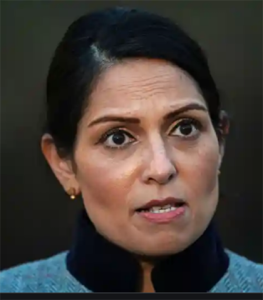UK migration debate descends into toxic rhetoric
A war of competing narratives has broken out in Britain over asylum seekers arriving by boat across the English Channel.
UK Conservative Government Home Secretary Priti Patel has claimed that 70 per cent of the arrivals are “economic refugees”.
 Meanwhile, commentators and advocates have demanded that she justify the claims.
Meanwhile, commentators and advocates have demanded that she justify the claims.
Two Labour Party members of the House of Lords, David Blunkett and Shami Chakrabarti, have also questioned whether the Ms Patel has evidence that backs her claim that “70 per cent of individuals on small boats are single men who are effectively economic migrants”.
And there is increasing concern among refugee charities that the government is feeding an untrue narrative that claims migrants who travel to the UK by boat are undeserving of sympathy.
At the House Lords home affairs and justice committee last week, Patel was questioned about her new policy of deeming any person who arrives in the UK to claim asylum after passing through a “safe” country as “inadmissible” – meaning their claim will not be considered.
“In the last year, 70 per cent of individuals on small boats are single men who are effectively economic migrants. They are not genuine asylum seekers,” she said, d escribing the people who would fall into this category.
Home Office officials were asked to provide data that backed up the home secretary’s assertions.
Local reports cited a source from the Home Office saying that of 8,500 people arriving by small boat in 2020, 87 per cent were men and 74 per cent were aged between 18 and 39 – but did not provide evidence related to their asylum claims.
A Home Office spokesperson said: “France is a safe country; people should claim asylum in the first safe country they reach rather than making dangerous and illegal crossings.”
Lady Chakrabarti, the former head of the human rights charity Liberty and a member of the committee, said Patel’s comments should be properly explained, corrected or withdrawn.
“Both the refugee convention and the lives of desperate people are too precious for the home secretary’s 70 per cent statement to go unchallenged,” she said.
“Is the Home Office really saying that most single male asylum seekers or most people crossing the Channel are ‘economic migrants’ and unworthy of refuge? If yes, what happened to giving anxious scrutiny to every individual claim for asylum?”
Lord Blunkett, the former Labour home secretary who asked Patel the question that provoked the “70 per cent” response, said the government could struggle to justify the figure because officials were still processing a backlog of asylum claims.
“It is not surprising that the Home Office has not responded to a request to justify the 70 per cent claim given that the backlog of cases is so extreme. The latest figure I saw was 125,000, which exceeds many previous years.
“There is a presumption being made by the home secretary about their claims before they have had an opportunity to make their claims. Until the backlog is massively reduced we won’t know about those arrivals who come over the summer,” he said.
Published Home Office data shows that many of those arriving on small boats whose claims were deemed inadmissible originate from conflict zones such as Iran, Iraq, Afghanistan and Sudan.
Migration Observatory researcher Dr Peter Walsh said that a majority of asylum claims, including those of people who arrived in the UK by boat), were ultimately successful.
The Home Office’s annual reports show that 59 per cent of claims filed in 2017 to 2019 inclusive were ultimately successful, accounting for appeals.
“It is reasonable to suppose that Channel migrants will be more likely than other asylum seekers to have their asylum claims granted,” Dr Walsh said.
“This is because the nationalities that are most common among Channel migrants – like Iranian, Syrian, Afghan and Yemeni – have a higher-than-average likelihood of ultimately being successful.
“It is not clear what evidence exists to support the claim that 70 per cent of Channel migrants are economic migrants. But on the basis of the available data, it seems unlikely that no more than 30 per cent of Channel migrants would have their asylum claims accepted,” Dr Walsh said.












